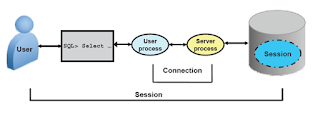Connecting to an Oracle Instance
Before users can submit SQL statements to an Oracle database, they must connect to an instance.
• The user starts a tool such as SQL*Plus,sql developer,toad or runs an
application developed using a tool such as Oracle Forms. This application or
tool is executed as a user process.
• In the most basic configuration, when a user logs on to
the Oracle server, a process is created on the computer running the Oracle
server. This process is called a server process. The server process
communicates with the Oracle instance on behalf of the user process that runs
on the client. The server process executes SQL statements on behalf of the
user.
User Process is started at the time a database user
request a connection to the oracle
server .
Server Process connect to the oracle instance and started
when a user establish a session .
user process & server
process are used to manage the execution of sql/plsql statements .
one-to-one correspondence between the User and Server
Processes. This is called a Dedicated Server connection. An alternative
configuration is to use a Shared Server where more than one User Process shares
a Server Process.
Server Process is the go-between for a Client Process and the Oracle Instance.
Dedicated Server environment – there is a single Server Process to serve each Client Process.
Shared Server environment – a Server Process can serve several User Processes, although with some performance reduction
Dedicated Server environment – there is a single Server Process to serve each Client Process.
Shared Server environment – a Server Process can serve several User Processes, although with some performance reduction
Connection
A connection is a communication pathway between a user
process and an Oracle server. A database user can connect to an Oracle server using tool,
sqlplus etc.
Sessions
A session is a specific connection of a user to an Oracle
server. The session starts when the user is validated by the Oracle server, and it ends when
the user logs out or when there is an abnormal termination. For a given database user, many
concurrent sessions are possible if the user logs on from many tools, applications, or terminals
at the same time.



No comments:
Post a Comment